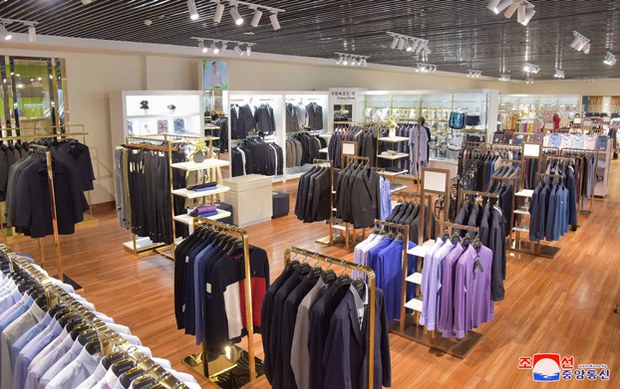Catering to North Korea’s elite, department stores stock up on fake luxury goods
Share

Clothing is displayed inside the Daesong Department Store in Pyongyang, North Korea, in an undated photo released on April 15, 2019.
Department stores in Pyongyang are stocking up on counterfeit luxury goods imported from China to sell at high prices to North Korea’s wealthy elite in the run-up to holidays at the start of the new year, sources inside the country with knowledge of the situation said.
Freight trains running between Dandong, China, and Sinuiju, North Korea, operate every day except weekends, bringing loads of fake luxury items into the country, said a source in North Pyongan province, which lies across the Yalu River from China and is a major trade route between the two countries.
“Chanel brand bags, perfumes and alcoholic beverages are being imported in large quantities on Dandong-Sinuiju freight trains that are assigned to trading companies affiliated with the party,” the source said.
The brand-name goods – some genuine but mostly counterfeits – are sold at about 10 department stores in the North Korean capital, including the Pyongyang Department Store No.1, the Rakwon Department Store and the Kwangbok Department Store, sell foreign brand clothing, bags and cosmetics, including fake goods, they said.
The stores offer products at market prices mainly in foreign currency, though some may be purchased for North Korean won.
The department stores are also importing large quantities of counterfeit goods to prepare for the suspension of trade with China for more than 15 days amid the Lunar New Year on Jan. 22, the source said.
The wealthy elite
The counterfeit brand-name goods cater to Pyongyang’s donju, or wealthy class who make up a sliver of the population, most of whom are quite poor.
The donju have emerged over the past 20 years, becoming rich by playing roles in the creation of informal markets called jangmadang, which became part of the economy after the famine that hit North Korea in the 1990s.
The markets of varying sizes sell legitimate items, though prohibited transactions of goods, such as Chinese-made cell phones, and foreign currency, can occur in some places. North Korean authorities initially forbid jangmadang, but they gradually allowed the markets because they provided a means for people to survive.
The new rich accumulated wealth from rent on spaces used by merchants or by charging high-interest rate loans. Others have made money by loaning authorities money to build large apartments, who in turn give the lenders units as part of the repayment, which they then rent out.
They also linked up with trading companies operated by the government to get a cut of the proceeds or through smuggling goods from China.
“The department stores are trying to take advantage of the demand by the donju,” said the source, who declined to be named so as to speak freely.
“They intend to earn foreign currency by selling counterfeit goods such as branded clothing, bags, alcohol and cosmetics at high prices for New Year’s Day and Lunar New Year’s Day,” he said.
The counterfeit products are being distributed through Pyongyang department stores after passing through the Uiju Quarantine Facility near North Korea’s northern border with China amid a recent increase in coronavirus cases in China, he said.
Mink coats
Mink coats imported by ship from China that have entered North Korea through the port in Nampo are being distributed to department stores in Pyongyang in the run-up to Jan. 1, said a trade official in the city, who declined to be identified so as to speak freely.
An important seaport in the isolated country, Nampo lies about 50 kilometers, or 31 miles, southwest of the capital city at the mouth of the Taedong River.
“Imported mink coats entering department stores in Pyongyang bear the famous brand name ‘Hermes,’ but all are counterfeits made in China,” said the source.
Though local prices for coats are 200-500 yuan, or U.S.$29-72, depending on the type, department stores in the capital are selling the mink coats for more than U.S.$500, he said.
Translated by Claire Shinyoung Oh Lee and Leejin J. Chung for RFA Korean. Written in English by Roseanne Gerin. Edited by Malcolm Foster.







